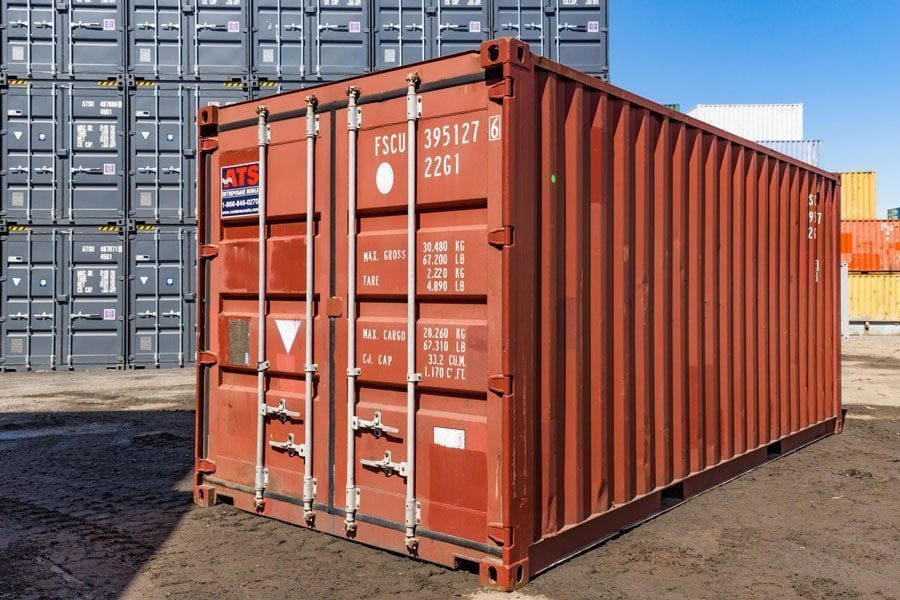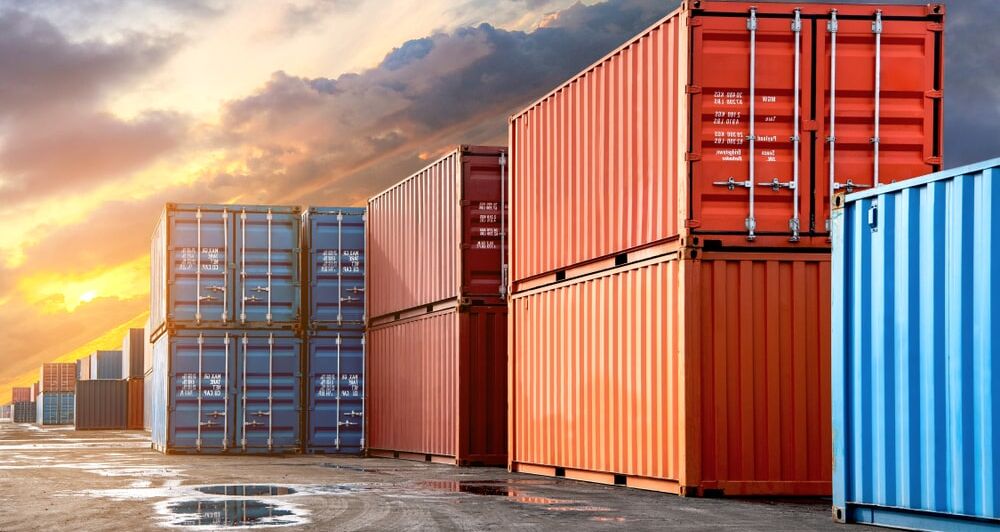Whatever You Need to Learn About Shipping Containers and Their Practical Applications
Shipping containers have actually advanced from plain devices for transportation to versatile structures with numerous useful applications. Their robust layout and common sizing make them excellent for a range of usages beyond delivery. From cutting-edge housing solutions to lasting farming, their adaptability is significant. Yet, the opportunities do not finish there. Exploring their numerous functions discloses unexpected insights into contemporary obstacles and creative options. What other duties could these containers play in today's globe?
The Design and Framework of Shipping Containers

Internally, containers are created to optimize area, frequently featuring wooden or steel flooring that can sustain significant weight. Air flow systems might be included to stop dampness accumulation, which is critical for sensitive freight. Additionally, strengthened corners enable simple handling by cranes and forklifts, promoting seamless loading and dumping. This thoughtful design and structure add to the containers' convenience across various shipping and storage applications.
Advantages of Using Shipping Containers
While numerous transportation techniques have their benefits, making use of delivery containers sticks out because of their unparalleled adaptability and performance. Shipping containers offer a standard size, making them simple to transfer and stack across different settings of transport, consisting of ships, trains, and trucks. This standardization lowers packing and unloading times, therefore raising total performance.
Shipping containers are constructed from resilient products, providing durable defense for products throughout transit. They are weather-resistant and safe, decreasing the risk of damages from environmental factors or burglary. In addition, the modular layout of delivery containers enables for simple customization, making it possible for organizations to adjust them for different purposes, such as storage or mobile workplaces.
Their transportability and cost-effectiveness make delivery containers an eye-catching choice for businesses looking to improve logistics and supply chain procedures. These advantages add to the expanding popularity of delivery containers in numerous markets.
Creative Real Estate Solutions With Shipping Containers
Ingenious housing solutions have actually become an amazing application of shipping containers, leveraging their intrinsic staminas for residential use. These flexible frameworks supply a sustainable choice to traditional building products, commonly at a fraction of the cost. Designers and developers have changed containers right into trendy, practical homes, satisfying varied way of livings and choices.

Additionally, delivering containers are eco-friendly, advertising recycling and minimizing waste. Many jobs concentrate on energy effectiveness, incorporating eco-friendly roofing systems and solar panels. As urbanization rises, these cutting-edge housing services provide a practical response to housing shortages while cultivating an unique building aesthetic.
Shipping Containers in Retail and Pop-Up Shops
A growing variety of stores are turning to shipping containers as a dynamic option for pop-up stores and retail spaces. These versatile frameworks supply a cost-efficient choice to traditional stores, permitting businesses to produce one-of-a-kind, eye-catching settings that bring in clients. Their modular design makes it possible for easy transportation and installation, making them suitable for short-term or seasonal retail areas.
Sellers can personalize delivery containers to show their brand name identification, changing them right into visually appealing stores that stand out in congested industries. The portable nature of containers likewise urges reliable usage of area, enabling creative designs that enhance consumer circulation and interaction. In addition, shipping containers can be situated in unconventional locations, such as city parks or uninhabited whole lots, raising access and foot website traffic.
As the retail landscape develops, delivering containers supply a cutting-edge and versatile remedy that fulfills the demands of modern consumers while enhancing the purchasing experience.
Sustainable Farming Practices Using Shipping Containers
Lasting farming practices significantly include delivery containers as ingenious remedies for agriculture - shipping container storage. These container farms use hydroponics to take full advantage of room and resource effectiveness, using an economical technique to food production. By transforming shipping containers right into agricultural centers, farmers can address food safety and ecological problems simultaneously
Container Farming Advantages
While typical farming encounters challenges such as land deficiency and climate modification, container farming provides a practical alternative that maximizes room and sources. This innovative technique enables for year-round crop production in regulated environments, decreasing reliance on climate condition. Container farms utilize much less water than conventional farming, promoting sustainability and preservation. They can be developed in city locations, bringing fresh fruit and vegetables closer to consumers and decreasing transportation discharges. In addition, the modular nature of delivery containers makes it possible for scalability, enabling farmers to change operations based upon demand. Container farming additionally lessens chemical use by producing an enclosed community, inevitably boosting food safety and security. As city populaces expand, container farming becomes a functional service to meet the raising demand for regional, lasting food resources.
Hydroponics in Containers
Hydroponics, which Resources allows plants to expand without soil by using nutrient-rich water, thrives within the confines of shipping containers, making it an ideal method for city farming. These containers produce a controlled atmosphere that optimizes humidity, light, and temperature level, allowing year-round farming. With limited room in city locations, shipping containers provide a scalable service for expanding fresh produce. Hydroponic systems within containers can include various methods, such as nutrient movie technique (NFT) and deep water culture (DWC), which take full advantage of return while minimizing water usage. This cutting-edge approach not just enhances food security but also decreases the carbon footprint associated with standard farming methods. As a result, hydroponics in containers stands for a forward-thinking option for lasting metropolitan food manufacturing.
Economical Farming Solutions
As food manufacturing encounters raising obstacles as a result of environment modification and urbanization, shipping containers become a cost-effective option for agriculture. These flexible structures can be repurposed for numerous sustainable farming techniques, such as hydroponics and upright farming. By utilizing controlled settings within containers, farmers can optimize development cycles and decrease resource intake, including water and fertilizers. In addition, delivering containers can be purposefully placed in metropolitan locations, reducing transport costs and enhancing access to fresh produce. Their modular nature permits scalability, allowing farmers to expand procedures as demand grows. Moreover, repurposing containers adds to waste reduction, straightening with environment-friendly agricultural campaigns. Generally, shipping containers present innovative possibilities for lasting and effective food production.
Emergency Situation and Calamity Relief Applications of Shipping Containers

Organizations often utilize home delivery containers to develop mobile facilities or area medical facilities, ensuring that medical care gets to those in need. In addition, they can be transformed right into command facilities for working with rescue operations, thus improving organizational performance during situations.
Containers can be modified to keep essential goods such as food, water, and clothes, protecting materials up until they are dispersed. Their wheelchair permits them to be easily carried to various areas, ensuring that help arrives where it is most urgently needed. Overall, shipping containers play a critical function in boosting the effectiveness of disaster relief initiatives worldwide.
Regularly Asked Questions
Just How Are Shipping Containers Transported From One Location to Another?
Shipping containers are carried via ships, vehicles, and trains, utilizing cranes for unloading and reference loading. This multi-modal transport system makes sure reliable movement throughout land and sea, linking global supply chains and assisting in global trade.
What Is the Ordinary Life-span of a Delivery Container?
The ordinary life expectancy of a delivery container usually varies from 10 to 25 years, relying on maintenance, usage, and environmental elements. Appropriate care can extend their usability, while neglect may lead to wear and tear and damage.
Can Shipping Containers Be Changed for Different Usages?
Yes, shipping containers can be changed for numerous usages. They work as homes, workplaces, pop-up stores, and storage units. Their flexibility enables imaginative adjustments, making them ideal for a variety of applications.
Are Shipping Containers Eco Friendly?
Shipping containers can be ecologically pleasant, as they advertise repurposing and recycling. Their resilience minimizes waste, while their usage in different real estate and companies reduces the need for brand-new materials, contributing to lasting techniques.
Just how Do I Select the Right Size Shipping Container?
To choose the right size delivery container, one must evaluate storage demands, take into consideration the desired usage, and review space availability - shipping containers for sale near me. Usual sizes consist of 40-foot and 20-foot containers, each serving numerous storage and transportation needs effectively
Ingenious housing options have arised as an interesting application of shipping containers, leveraging their integral strengths for property use. The flexibility of delivery containers enables for creative designs, from single-unit houses to complicated multi-container plans. Sustainable farming techniques increasingly include shipping containers as ingenious remedies for agriculture. In addition, the modular nature of delivery containers allows scalability, permitting farmers to adjust procedures based on need. Hydroponics, which allows plants to expand without soil by using nutrient-rich water, thrives within the boundaries of shipping containers, making it an optimal approach for urban farming.